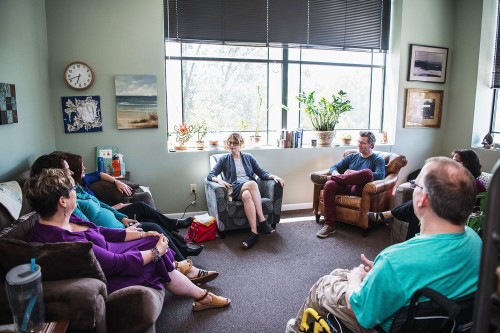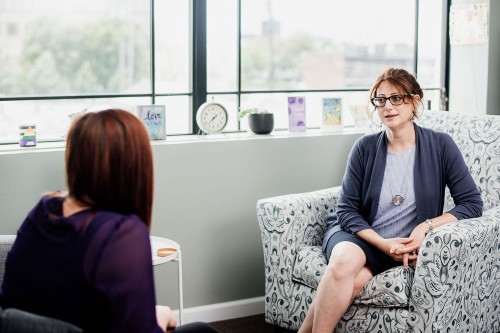





Affirmations Psychological Services
Treatment Focus
At this center, you receive personalized care for mental health conditions. They provide therapy and tailor treatment to your unique needs, diagnoses, and preferences.
Primary Level of Care
Delivers regular one-on-one sessions focused on emotional support, coping strategies, and goal-setting, fostering long-term healing and personal development in an outpatient setting.
This provider hasn't verified their profile's information. Are you the owner of this center? Claim your listing to better manage your presence on Recovery.com.
Treatment Focus
At this center, you receive personalized care for mental health conditions. They provide therapy and tailor treatment to your unique needs, diagnoses, and preferences.
Primary Level of Care
Delivers regular one-on-one sessions focused on emotional support, coping strategies, and goal-setting, fostering long-term healing and personal development in an outpatient setting.
Provider's Policy
Our therapists accept most major insurance plans. Our friendly and talented office manager Paula Bearns Keller will help you with appointment scheduling and insurance issues. Clients may also opt to pay for services out-of-pocket.
Affirmations Psychological Services
Affirmations Psychological Services
About Affirmations Psychological Services
For over 30 years, Affirmations has provided psychological and therapeutic services to residents of Ohio. Their mission from the start has been to provide acceptance and understanding for human beings who identify as culturally, ethnically, spiritually, sexually or cognitively diverse. They offer individual, child and family, and group therapy. In the intake process, a clinician will pair the client with a provider who has a special interest and tailored approach that can help best meet the client’s needs. While many evidence-based therapies are used at Affirmations, the group of clinicians approach their work from a humanistic perspective, embracing and validating the client’s experiences, thoughts, and feelings. Some of the most commonly used therapies include radically open dialectical behavioral therapy, trauma-informed therapy, solution-focused therapy, and expressive arts therapy.
Core Service
Clients can choose to participate in group therapy as a way to share experiences and feel validated and heard. Affirmations offers psychoeducational groups that are centered on a certain diagnosis, life experience, or condition. Group members can learn skills and scientific research on the topic. They also offer process groups, which focus on verbally sharing experiences and exploring dynamics that emerge as members open up. The Affirmations website offers resources including an extensive self-help book list, and articles on neurodiversity, humanism, and today’s trends in the mental health field. Affirmations accepts most forms of insurance and also offers self-pay options.
Center Overview
Treatment Focus
At this center, you receive personalized care for mental health conditions. They provide therapy and tailor treatment to your unique needs, diagnoses, and preferences.
Insurance Accepted
Cash Pay Rates
Estimated Cash Pay Rate
Center pricing can vary based on program and length of stay. Contact the center for more information. Recovery.com strives for price transparency so you can make an informed decision.
Levels of Care



Your Care Options
Specializations
Private Therapy
This is an individual therapy that's often available at private therapy clinics. Clients may be able to choose a therapist who best fits their unique needs.
LGBTQ+
Addiction and mental illnesses in the LGBTQ+ community must be treated with an affirming, safe, and relevant approach, which many centers provide.
Couples Counseling
Partners work to improve their communication patterns, using advice from their therapist to better their relationship and make healthy changes.
Who We Treat
Men and Women
Men and women attend treatment for addiction in a co-ed setting, going to therapy groups together to share experiences, struggles, and successes.
Young Adults
Emerging adults ages 18-25 receive treatment catered to the unique challenges of early adulthood, like college, risky behaviors, and vocational struggles.
Adolescents
Teens receive the treatment they need for mental health disorders and addiction, with the added support of educational and vocational services.
Children
Treatment for children incorporates the psychiatric care they need and education, often led by on-site teachers to keep children on track with school.
LGBTQ+
Addiction and mental illnesses in the LGBTQ+ community must be treated with an affirming, safe, and relevant approach, which many centers provide.
Approaches
Experiential
Expressive tools and therapies help patients process past situations, learn more about themselves, and find healing through action.
Evidence-Based
A combination of scientifically rooted therapies and treatments make up evidence-based care, defined by their measured and proven results.
Individual Treatment
Individual care meets the needs of each patient, using personalized treatment to provide them the most relevant care and greatest chance of success.
Therapies
1-on-1 Counseling
Patient and therapist meet 1-on-1 to work through difficult emotions and behavioral challenges in a personal, private setting.
Family Therapy
Family therapy addresses group dynamics within a family system, with a focus on improving communication and interrupting unhealthy relationship patterns.
Acceptance and Commitment Therapy (ACT)
This cognitive behavioral therapy teaches patients to accept challenging feelings and make the appropriate changes to reach personal goals.
Psychoeducation
This method combines treatment with education, teaching patients about different paths toward recovery. This empowers them to make more effective decisions.
Solution Focused, Goal-Oriented Therapy
A quick goal-oriented therapy that helps patients identify their current and future goals, find out how to achieve them, and empower future problem-solving.
Trauma-Specific Therapy
This form of talk therapy addresses any childhood trauma at the root of a patient's current diagnosis.
Gestalt Therapy
This treatment teaches self-awareness, interrupts negative thought patterns, and gives patients insight into how their environment impacts mental health.
Conditions We Treat
Post Traumatic Stress Disorder
PTSD is a long-term mental health issue caused by a disturbing event or events. Symptoms include anxiety, dissociation, flashbacks, and intrusive thoughts.
Anxiety
Anxiety is a common mental health condition that can include excessive worry, panic attacks, physical tension, and increased blood pressure.
Depression
Symptoms of depression may include fatigue, a sense of numbness, and loss of interest in activities. This condition can range from mild to severe.
Grief and Loss
Grief is a natural reaction to loss, but severe grief can interfere with your ability to function. You can get treatment for this condition.
Codependency
Codependency is a pattern of emotional dependence and controlling behavior. It's most common among people with addicted loved ones.
Stress
Stress is a natural reaction to challenges, and it can even help you adapt. However, chronic stress can cause physical and mental health issues.
Bipolar
This mental health condition is characterized by extreme mood swings between depression, mania, and remission.
Trauma
Some traumatic events are so disturbing that they cause long-term mental health problems. Those ongoing issues can also be referred to as "trauma."
Self-Harm
The act of intentionally harming oneself, also called self-injury, is associated with mental health issues like depression.
Languages
Care Designed for Your Needs
Special Considerations
Couples program
Using gentle clinical care, therapists guide patients and their partner through guided sessions to address issues and work towards lasting solutions.





